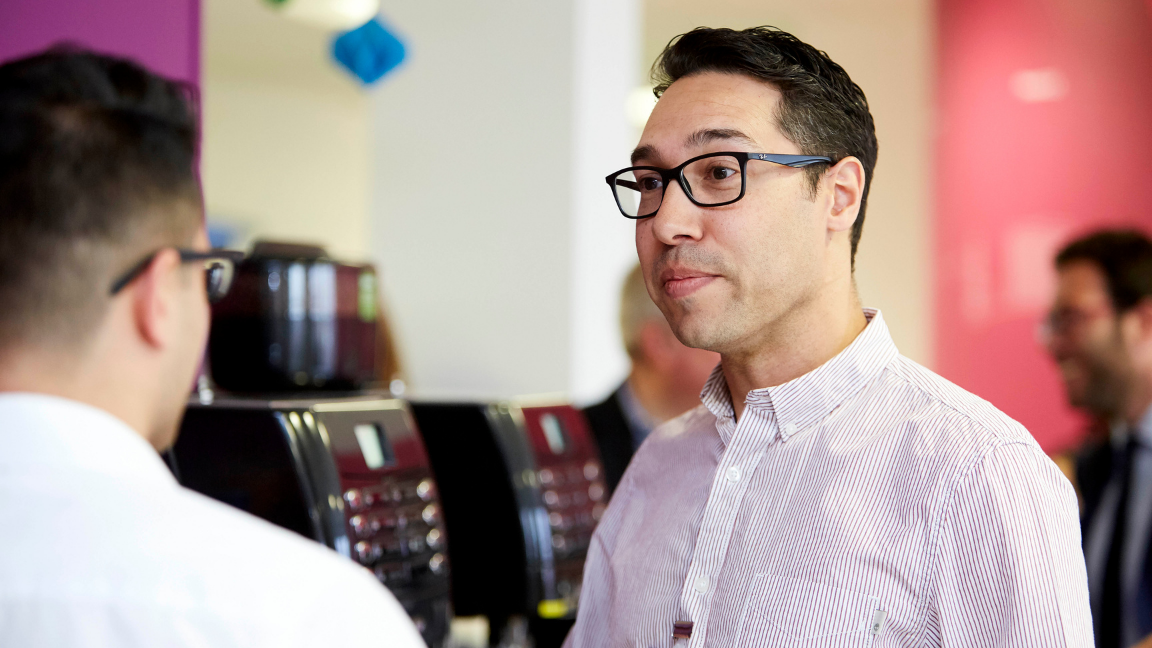
Case Study
Boosting career progression: from academia to industry
Date: March 21, 2022
Dr Tom Baboolal’s career transition from academic research in cell biology to a clinical researcher position in industry was made possible through the IKC.
Now a Senior Clinical Research Scientist at Depuy Synthes, Tom’s route into industry was an unusual one. After a PhD in biochemistry and biophysics at Newcastle University he took a postdoctoral research position at the University of Leeds focusing on fairly fundamental biology, investigating bacterial then human protein structures and interactions.
Tom says: “Our lab was doing basic science research, and while I got some great publications from it, it was a long way from clinical application, which is where I ultimately wanted to be. I’ve always felt strongly that research should be used to benefit patients and was looking for ways to move towards a more translational role in industry, but I lacked the right skills and experience.”
Lucky break
When funding for his postdoctoral research project ended, a chance conversation together with Tom’s publication record and cell culture skills landed him a position in Professor Dennis McGonagle’s lab in the University of Leeds School of Medicine, where the team were investigating the potential therapeutic use of stem cells to repair cartilage. Working with surgeons to understand the practicalities of different surgical techniques led Tom to spot an opportunity to apply this research – and realise a childhood dream of inventing a medical device for clinical use.
Although the device was ultimately not taken forward, the process kickstarted by IKC proof of concept funding gave him invaluable knowledge and experience to move from academia into the job he now has with Depuy Synthes, which is part of the largest healthcare company in the world, Johnson & Johnson.
“Working on an IKC-funded project gave me the opportunity to gain a huge wealth of product development experience, something that postdocs rarely have the chance to do,” Tom recalls. “Supported by the IKC’s Technology Innovation Manager Graeme Howling and drawing on the extensive industry contacts of the IKC team, I had to become an independent project manager almost overnight.”
Skills development and secondment
Tom supervised a student and developed skills to design his device and work on a prototype. He consulted with an engineering and sterilisation company, orthopaedic surgeons, met with patent and intellectual property experts and drew up a clinical trial protocol and an ethics application. In essence, Tom carried out exactly the kind of work that is done in industry, which he knew would stand him in good stead when the right job opportunity presented itself.
When the work on Tom’s device came to a close, the IKC team offered him a three-month secondment within their team. Tom jumped at the chance.
He says: “I knew this would be another good stepping stone, adding to my practical experience of the translation pathway. I helped review proof of concept funding applications, was part of the decision-making process and provided written feedback to both successful and unsuccessful applicants. It was interesting to review ideas that seemed great on paper, only to see that the market was too small, the IP landscape or regulatory pressures would be too challenging, or even that the idea simply wasn’t yet underpinned by enough published research.”
“Both the IKC project and the secondment cemented the conviction that my future lay not in academia, but as an industrial researcher. Alongside new skills, I now had the confidence to apply for my current position. My role is in strategic clinical research, working on new products and developing the strategy that gives us the clinical evidence to allow us to market devices all over the world. I’m a small cog in a big company, but it’s a vital role and contributes to enabling people to benefit from the latest technologies. It took a while, but I’m now where I’ve always wanted to be.”
Back to Case Studies
